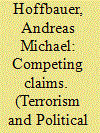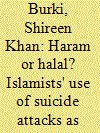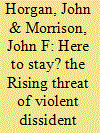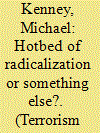|
|
|
Sort Order |
|
|
|
Items / Page
|
|
|
|
|
|
|
| Srl | Item |
| 1 |
ID:
109788


|
|
|
|
|
| Publication |
2011.
|
| Summary/Abstract |
Drawing on social movement and media literature, this article examines what factors influence coverage of the Corsican nationalist movement in Western European news coverage. A content analysis of 317 newspaper and magazine articles shows that representations and standing of the movement's claims is contingent on prevailing French politics. Contrary to expectations of the dominant literature, violence does not increase media attention.
|
|
|
|
|
|
|
|
|
|
|
|
|
|
|
|
| 2 |
ID:
109786


|
|
|
|
|
| Publication |
2011.
|
| Summary/Abstract |
Suicide attacks are an important, and effective, terror tactic in Al Qaeda and other Islamist Movements' (AQOIM) tool kit as they wage jihad al saghir (lesser jihad) against the kuffar (infidels). The successful 9/11 terrorist attacks on American soil would not have been possible without the willingness of 19 young Arab men to commit intihar (suicide). AQOIM's "marketing" of suicide attacks in their propaganda campaigns as "martyrdom operations," leads one to ask: Is the use of suicide as a military tactic in war against the kuffar sanctioned in Islam both scripturally and/or by the interpretations/opinions of Muslim scholars and religious figures, as well as by the Muslim public? This article explores the ongoing jihad (struggle) within Islam on what does and does not constitute "martyrdom operations." It does so by exploring the legality of such acts through the lens of Islamic doctrine (Quran and Hadith), as well as studying the interpretations of respected ulema (scholars) on whether or not suicide attacks are indeed "martyrdom operations" to be praised as "halal," or to be condemned as "haram" (forbidden).
|
|
|
|
|
|
|
|
|
|
|
|
|
|
|
|
| 3 |
ID:
109789


|
|
|
|
|
| Publication |
2011.
|
| Summary/Abstract |
Since the advent of the Good Friday peace agreement, violence associated with dissident Irish Republican groups continues to present major security challenges. While there has not been a tragedy on the scale of the 1998 Omagh bombing, the level of violent dissident Republican (VDR) activity has risen steadily in frequency since then, and in 2010 reached unprecedented levels. This article presents findings from the VDR Project at the International Center for the Study of Terrorism at Pennsylvania State University. The research is based on the extensive identification, collection, and analysis of open source material examining the nature and extent of VDR activity from 1997 to 2010. The project analyses data on VDR activity across this period as well as the individuals taking part in these violent events. The data suggests that while originally recruitment was predominantly southern based it is now more focused on Northern Ireland. Analysis of the data also indicates that the VDR leadership continues to recruit individuals with skill-sets to serve the movement's aims.
|
|
|
|
|
|
|
|
|
|
|
|
|
|
|
|
| 4 |
ID:
109783


|
|
|
|
|
| Publication |
2011.
|
| Summary/Abstract |
The London bombings in 2005 led to the perception that the terrorist threat had changed from external to internal. This became conceptualized shortly after as "homegrown terrorism." This article deals with the meaning and scope of this phenomenon. We begin by tracing an ambiguity in the term "homegrown," which is both about belonging in the West and autonomy from terrorist groups abroad. A quantitative study of Islamist terrorism in the West since 1989 reveals an increase in both internal and autonomous terrorism since 2003 and that most plots are now internal-but not autonomous. Finally we suggest that an increase in autonomous terrorism is a transitory phenomenon.
|
|
|
|
|
|
|
|
|
|
|
|
|
|
|
|
| 5 |
ID:
109784


|
|
|
|
|
| Publication |
2011.
|
| Summary/Abstract |
A series of police raids in Príncipe Alfonso, a Muslim neighborhood located in the Spanish enclave of Ceuta, "confirmed" law enforcement officers' worst fears: the barrio, long considered a hotbed of Islamist radicalization, had succumbed to the influence of extremists, making Spain more vulnerable to terrorist attacks. However, the meager results of the raids, as well as delays in the ensuing criminal investigation, raised troubling questions about the alleged terrorist plot and outsiders' perceptions of the Muslim community. Seeking answers to these questions, I conducted ethnographic field work in Príncipe shortly after the raids, interviewing residents, activists, and officials and observing the community at length. The community I experienced did not match the neighborhood I had read about. This article, the first ethnographic study of Ceuta to focus on radicalization, challenges conventional understandings of Príncipe Alfonso and highlights the value of ethnographic field work in terrorism studies.
|
|
|
|
|
|
|
|
|
|
|
|
|
|
|
|
| 6 |
ID:
109785


|
|
|
|
|
| Publication |
2011.
|
| Summary/Abstract |
Drawing from the work of political theorists, theologians, anthropologists, journalists, philosophers, and contemporary psychologists studying Terror Management Theory (TMT), it becomes possible to see that the concepts of existentialism and ideology may be useful for modern thinkers attempting to understand a problem such as terrorism. Integrating work from these fields makes it possible to see that terrorism may be driven by an existential-terroristic feedback loop: a cycle in which people support or engage in terrorism to alleviate existential anxiety but ultimately find this anxiety exacerbated in the wake of the violence they create or sanction. The loop is closed when this exacerbated anxiety compels them to reaffirm their support of, or participation in, terrorist violence. If this model is valid, then effectively addressing the problem of terrorism requires joining existing U.S. policies with policies that address ideologies. Specifically, policies must aspire to a) mitigate existential anxiety, b) provide a compelling counter-narrative, c) address environmental factors conducive to radicalization, d) prevent the formation of radicalized groups, and e) deradicalize existing ideologues.
|
|
|
|
|
|
|
|
|
|
|
|
|
|
|
|
| 7 |
ID:
109782


|
|
|
|
|
| Publication |
2011.
|
| Summary/Abstract |
Since the mid-1990s, academic and policy communities have debated the risk posed by terrorist use of chemical, biological, radiological, or nuclear (CBRN) weapons. Three major schools of thought in the debate have emerged: the optimists, the pessimists, and the pragmatists. Although these three schools of thought draw on the same limited universe of data on CBRN terrorism, they arrive at strikingly different conclusions. Given the highly subjective process of CBRN terrorism risk assessment, this article analyzes the influence of mental shortcuts (called heuristics) and the systemic errors they create (called biases) on the risk assessment process. This article identifies and provides illustrative examples of a range of heuristics and biases that lead to the underestimation of risks, the overestimation of risks and, most importantly, those that degrade the quality of the debate about the level of risk. While these types of biases are commonly seen as affecting the public's perception of risk, such biases can also be found in risk assessments by experts. The article concludes with recommendations for improving the CBRN risk assessment process.
|
|
|
|
|
|
|
|
|
|
|
|
|
|
|
|
| 8 |
ID:
109787


|
|
|
|
|
| Publication |
2011.
|
| Summary/Abstract |
This article attempts to consolidate theorizing about the radicalization of Western homegrown jihadists. Five major models of radicalization are reviewed. The commonalities and discrepancies among these models are identified and analyzed in the context of empirical evidence in the field of terrorism research and social psychology. Three psychological factors emerge as contributors to radicalization: group relative deprivation, identity conflicts, and personality characteristics. Avenues for future research concerning the radicalization of homegrown jihadists are suggested, focusing on research that may not only be practical for counter-terrorism, but also feasible given the challenges of research with radicalized individuals.
|
|
|
|
|
|
|
|
|
|
|
|
|
|
|
|
|
|
|
|
|